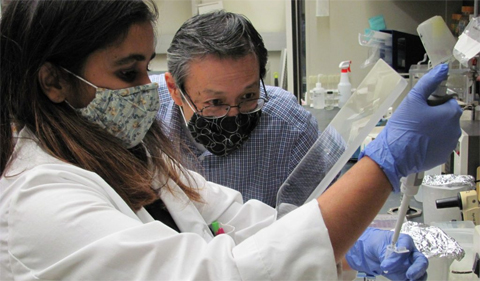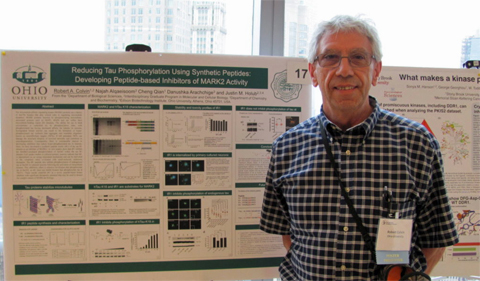
Dr. Tomo Sugiyama, Associate Professor of Biological Sciences, instructs graduate student Mahima Sanyal in his lab in the Life Sciences Building on the Ohio University campus.
by Hannah Cordes
Dr. Tomo Sugiyama, Associate Professor of Biological Sciences, recently received grant support from the National Institutes of Health (R15 grant, $453,000 for three years) to continue his research on the molecular mechanisms of mutagenesis.
His study will lead to a better understanding of the biochemical mechanisms that underlie cancer-causing mutations. Currently, research on such mechanisms of DNA mutation is limited. Although scientists have elucidated how carcinogens may damage DNA, it is not well explained how such biochemical damage is converted to gene mutations. The damage to mutation conversions must be complex biochemical processes, most of which are poorly described.
One long term goal Sugiyama and his team have is to fill this knowledge gap. Most recently, Sugiyama and his research team have published a paper where they propose a new mechanism of mutagenesis by ultraviolet light (Sugiyama, T. and Y. Chen (2019). “Biochemical reconstitution of UV-induced mutational processes.” Nucleic Acids Res 47(13): 6769-6782). Now the team is also working on several carcinogens, including reactive oxygen species, anti-cancer drugs, acetaldehyde (an alcohol degradation product), and tobacco smoke.
Mahima Sanyal is a second year Ph.D. student working under Sugiyama studying the biochemical processes that lead to DNA mutations. Before coming to Ohio University, Sanyal worked for a cancer institute in India where she earned her master’s degree. Once she earns her Ph. D., she would like to continue her research on the mutations behind the formation of cancer and broaden her expertise on the subject.



















Comments